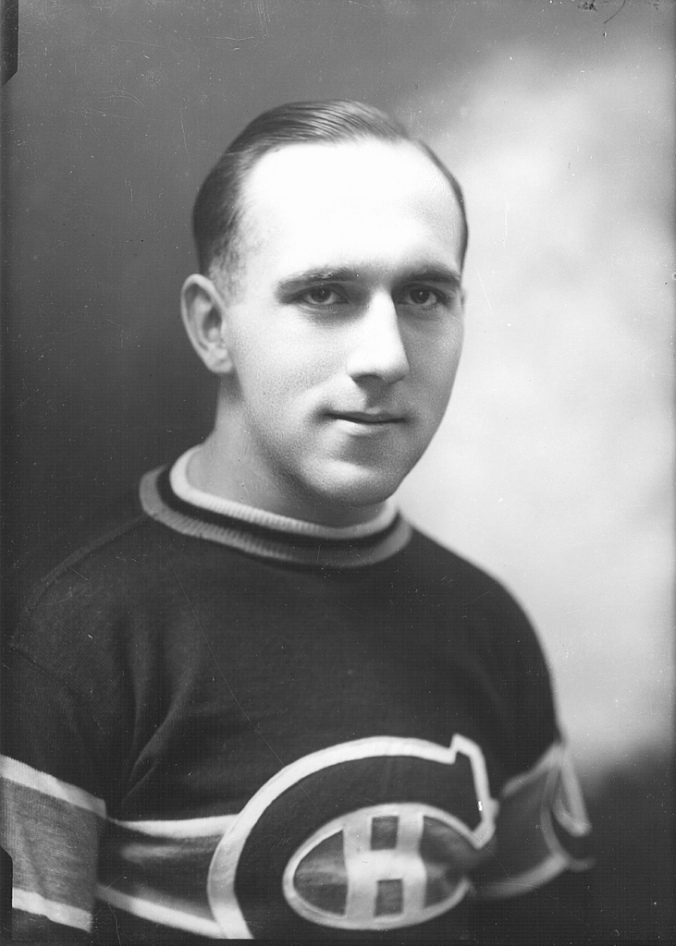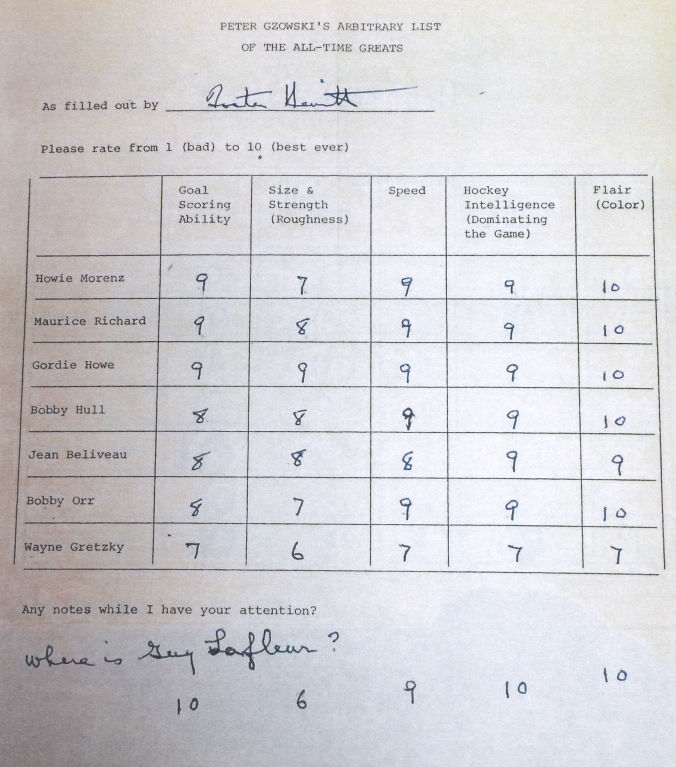
Stratford’s Own Streak: Howie Morenz in Hab finery in the 1920s. (Image: Archives de la Ville de Montréal)
Cyclone Taylor was the best hockey player ever to have played the game, according to the one-time NHL referee and newspaperman Mike Rodden — well, Taylor and Scotty Davidson, too. Lester Patrick agreed on Taylor, citing his speed (marvelous, skating forward and backward), his goal-scoring (great), his temperament (superb), and so did Tommy Gorman. Though Bill Cook, a star in his own right, insisted that Ching Johnson was the finest player he’d ever seen. Although for Art Ross, no mean judge of hockey talent, it was Eddie Shore.
These are old opinions, originally expressed in the 1930s and ’40s. The players named skated on even more distant horizons. Cyclone Taylor’s playing days ended in the early 1920s; Scotty Davidson was killed in First-World-War action a year after he’d captained the Toronto Blueshirts to a Stanley Cup championship.
There’s an argument to be made that evaluations so antique must be out of date, if only because the men behind them couldn’t help but be men of their times. Bill Cook lived the longest of them, until 1986, which means that while he was surely aware of the glories of Bobby Orr Wayne Gretzky, his experience would never include views of Sidney Crosby’s guile, or Connor McDavid’s high-speed genius.
It’s likewise true that there are limits on what Orr and Gretzky have seen first-hand. I’m not really disputing their joint assertion, from this past Friday, that Gordie Howe is the greatest hockey player ever, ever, and/or (Mario Lemieux was there and he said so, too) ever.
Could be. Who am I to say? I am interested by the notion that when Rodden and Patrick and Ross spoke up, their opinions were based on personal, eyewitness experience. They’d seen — and in many cases played with or against — all the hockey players who might possibly have been in any conversation concerning the best of all players.
This is a good reason to pay attention to a project of the late Peter Gzowski’s I came across not long ago. The venerable writer, editor, and CBC host was a lifelong hockey fan of who studied and celebrated it in his writing throughout his career. He wrote one of the sport’s most penetrating books, The Game of Our Lives (1980).
In 1985 he confessed that with that book he’d expunged some of his passion for hockey from his system, and it is true that at least one other book idea he had subsequently fell by the way. But the archives reveal that even as his account of the Oilers in bloom was finding its way into readers’ hands, he had other hockey projects in mind.
To wit: in the summer of 1980, Gzowski launched an inquiry into the best of the NHL best that involved polling a panel of some the game’s longest serving observers.
Was it for another book he was planning? I think so, though I can’t say for sure. It wasn’t what you’d classify as a stringently scientific survey. But then the surveyor himself acknowledged that himself, not least by framing his project as Peter Gzowski’s Arbitrary List of the All-Time Greats.
The nine men he chose to consult constituted an all-star line-up of hockey observers, so far as it went. That they were all in their senior years reflects, I think (probably?), Gzowski’s desire to be relying on first-hand knowledge of the players in question.
And so he sought out Foster Hewitt, then 78, the first man to broadcast an NHL game. Columnist Milt Dunnell of The Toronto Star was 75, and had been writing about hockey since the 1930s. The Boston Globe’s Tom Fitzgerald, 68, had started covering the Bruins in 1940. They were joined by Jim Coleman, 68, from The Globe and Mail, and Andy O’Brien, 70, the prolific Montreal Star writer and sports editor of Weekend Magazine who’d covered 45 Stanley Cups.
Gzowski sent a ballot to 77-year-old King Clancy, who’d started his NHL career as a stand-out defenceman with the original Ottawa Senators in 1921. He sought the counsel, too, of Frank J. Selke, 87, architect of all those firewagon Montreal Canadiens teams of the 1950s. Selke’s one-time boss was on the list, too, Toronto Maple Leafs titan Conn Smythe, 85. Finally, there was 75-year-old Clarence Campbell, the former NHL referee whose 31-year reign as president of the league had come to an end in 1977.
The ballot Gzowski (who, since we’re sharing, was 46) typed up and sent out was arbitrary, which is to say narrowly directed: it featured a list of just seven players from NHL history, six of them forwards, one from the defence. He was asking for scores on Howie Morenz, Maurice Richard, Gordie Howe, Bobby Hull, Jean Béliveau, Bobby Orr, and Wayne Gretzky in five categories:
Goal Scoring Ability
Strength (Roughness)
Speed
Hockey Intelligence (Dominating the Game)
Flair (Color).
“Please rate,” Gzowski directed, “from 1 (bad) to 10 (best ever).”
At the bottom of the page, he added a question: “Any notes while I have your attention?”
All of the nine wrote back.
“Nice 7 you picked,” Andy O’Brien enthused in his note.
“Give Gretzky 2 or 3 more years!!” was Coleman’s plea. “Then he’ll rate right up there with the others.”
King Clancy completed his ballot and returned it without comment.
Frank Selke’s was all comment, with no ratings. “I am returning your hypothetical chart of hockey greats,” his stern letter read.
I do not think it is possible to do justice to any former great by comparing him with players of another era.
I do not deny you the right to do this if you wish and will not quarrel with your findings. But I do not want to take any part in these ratings.
Conn Smythe’s reply was prompt, though he didn’t want to rate anyone, either. He was more than happy, however, to weigh in with a general and/or cantankerous opinion or two:
Maurice Richard and Howie Morenz rated tops in everything you have asked. Gordie Howe I have to take was a great player, but if he was as good as they say he was he should have been on more championship teams. I don’t rate Bobby Hull as a team man. He won one world championship and was a totally individual player. Jean Béliveau I have to say he was one of the all time greats, as was Bobby Orr. Wayne Gretzky I did not see play, so I cannot say.
Knowing what he knew 53 years after he took control of the Leafs, he said that any notional all-time team he might build would start with Ted Kennedy. Syl Apps would be on it, too, and Babe Pratt. “As these players helped me win world championships many times, perhaps I am prejudiced.”
Who else?
If I had the above players of my own plus the choice of those on your list, plus some of the following names, then I would fear nobody in the world:
Red Kelly
Max Bentley
Bill Cook
Milt Schmidt
Eddie Shore
Dit Clapper
Harry Watson
George Armstrong
Bill Barilko.
Milt Dunnell had a quibble that he took up in the p.s. he added to Gzowski’s ballot. “Can’t help thinking you have been unfair to goalies. Without good goaling, none of these greats would have been so great.” He also wondered whether Gretzky really deserved his place on the list, given that he’d only played two NHL seasons to date.
Not everybody was quick to reply. Foster Hewitt delayed. Clarence Campbell sent back his ballot with Gretzky unrated, and added a handwritten aside:
My evaluation of Gretsky [sic] may not do justice to his real capabilities. I have not seen him play enough to make a valid assessment in contrast to the other 6 career greats.
Months passed and, with them, the 1980-81 season. By the end of it, Gretzky had broken Bobby Orr’s record for most assists in a single season and blown by the old Phil Esposito mark for most points. Gzowski seems to have prodded the former president not long after the season ended. Was he ready now to pass judgment on the 20-year-old Oiler centre?
Campbell replied that he had indeed followed accounts of Gretzky’s successes throughout season. But:
I am still in no better position to do a thorough and conscientious assessment simply because I have not seen him in action once during the season, so I have no better appreciation of his talents than I had a year ago when I declined to make an evaluation of him. The reason I did not see him is that until a month ago I could not see well enough to make it worthwhile to attend the games or to follow the games on TV. A month ago I had a cataract operation which has restored my sight in the operated eye to 20-20.
Seeing clearly, he would be pleased to evaluate Gretzky — if he could just have another year. Gzowski, surely, wanted his own assessment, “not the product of a media consensus.”
I believe that young Gretzky is a truly phenominal [sic] performer and will look forward to watching him next season.
I can’t say whether Campbell’s Gretzky numbers ever came in. Foster Hewitt’s had arrived, with a bonus Guy Lafleur score written in at the bottom. Hard to say whether Gzowski considered his effort a success or disappointment, or at which point he stowed away the vision he’d had for a book. He did take the time to tot up his totals in the summer of 1981 with the numbers he had at hand.
Without Smythe and Selke, he had six completed ballots along with Campbell’s all-but-Gretzky version. The only player to score 10s in every category was Howie Morenz, courtesy of the man who’d faced him on the ice, King Clancy. It was Clancy who doled out the lowest mark of all, too: Gretzky, for him, was a mere 5 when it came to Size and Strength (Roughness).
When it came to the final reckoning, Gretzky’s incomplete numbers dropped him off the final tally. Adding up the rest, Gzowski came to this ranking:
- Howie Morenz
- Maurice Richard
- Bobby Orr
- Gordie Howe
- Bobby Hull
- Jean Béliveau.
